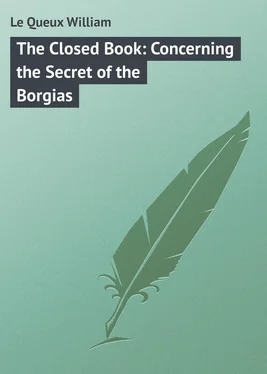William Le Queux - The Closed Book - Concerning the Secret of the Borgias
Здесь есть возможность читать онлайн «William Le Queux - The Closed Book - Concerning the Secret of the Borgias» — ознакомительный отрывок электронной книги совершенно бесплатно, а после прочтения отрывка купить полную версию. В некоторых случаях можно слушать аудио, скачать через торрент в формате fb2 и присутствует краткое содержание. Жанр: foreign_prose, на английском языке. Описание произведения, (предисловие) а так же отзывы посетителей доступны на портале библиотеки ЛибКат.
- Название:The Closed Book: Concerning the Secret of the Borgias
- Автор:
- Жанр:
- Год:неизвестен
- ISBN:нет данных
- Рейтинг книги:4 / 5. Голосов: 1
-
Избранное:Добавить в избранное
- Отзывы:
-
Ваша оценка:
- 80
- 1
- 2
- 3
- 4
- 5
The Closed Book: Concerning the Secret of the Borgias: краткое содержание, описание и аннотация
Предлагаем к чтению аннотацию, описание, краткое содержание или предисловие (зависит от того, что написал сам автор книги «The Closed Book: Concerning the Secret of the Borgias»). Если вы не нашли необходимую информацию о книге — напишите в комментариях, мы постараемся отыскать её.
The Closed Book: Concerning the Secret of the Borgias — читать онлайн ознакомительный отрывок
Ниже представлен текст книги, разбитый по страницам. Система сохранения места последней прочитанной страницы, позволяет с удобством читать онлайн бесплатно книгу «The Closed Book: Concerning the Secret of the Borgias», без необходимости каждый раз заново искать на чём Вы остановились. Поставьте закладку, и сможете в любой момент перейти на страницу, на которой закончили чтение.
Интервал:
Закладка:
I was very surprised at this. He had probably returned to Leghorn by an earlier train from Florence; but why he wished to see me after secretly spying upon my movements I was at a loss to know. One must, however, be clever to comprehend the ingenuity of the Italian, with all his diplomatic smiles and ingenious subtleties.
“If he comes I will see him,” I responded; adding, “Do you know, Nello, I don’t like that man.”
“Ah, signore!” answered the old fellow, “you should never trust a hunchback.”
“But when I asked you about him you knew nothing to his detriment. I look to you to make inquiries about such people.”
“At the time I was in ignorance, signore,” he said apologetically; “but I have learned several things since.”
“Things that are not very creditable, eh?” I asked, regarding his weird, almost grotesque figure in ill-fitting black coat and crumpled shirt-front.
He hesitated as though unwilling to tell me the whole truth. He was always reserved regarding any person of bad character, and, generally speaking, a Tuscan never cares to denounce his compatriots to a foreigner.
“If I were you, signore,” he said, “I’d have nothing to do with any gobbo .”
“But I’ve bought several good manuscripts from him,” I argued.
“The signore must please himself,” he remarked. “I have warned him.”
I really did not desire any warning, for the mysterious appearance of the old hunchback’s face at the church window was sufficient to cause me grave suspicion. But Nello for three years past had exercised a kind of paternal care over me, seeming to regard with wonder that I could scribble piles upon piles of paper and get paid for it. It was really wonderful how I wrote roman, he often declared. He read two of them translated into Italian and published serially in the Tribuna , and kept the copies neatly tied in bundles, which he proudly showed to his friends as the work of his padrone .
“Well, had I better see the gobbo ?” I asked.
“No, signore, I would not,” was his prompt advice. “He has no business to come here. His place is in the piazza, and it is impudence to call upon a gentleman.”
“Then tell him I’m engaged. I’ll want nothing more tonight. Don’t disturb me.”
“ Benissimo, signore; buona notte .” And old Nello went softly out well satisfied, leaving me to my coffee and my old manuscript.
I had not asked Nello to give his reason, because I knew that he would refuse to be drawn. He was a clever old fellow, and would, in argument, get the better of me.
So, the music having ceased, I reopened the window, and in the fading light settled myself to a pleasant hour with my latest acquisition.
Further acquaintance with the splendid volume was not disappointing. It was certainly a treasure; and having glanced casually at the coloured miniatures and gilt initials, I turned to the first page of the record written upon the blank pages at the end.
The cursive writing with its long flourishing was extremely difficult to decipher, and the ink much inferior to that used by the old monk Arnoldus, for it was faded and brown, having evidently been penned by one who had no acquaintance with the Gothic or book-hand. The writing was undoubtedly that of the early sixteenth century.
The first line I was able to make out read as follows:
Qui scripsit scripta manus eius sit benedicta , while, as far as I could decipher it, the record ended in the following manner:
Qui me scribebat Godefridus nomen habebat
Godefridus Lupellus
de Croylandia
me scripsit anno
domini 1542 in no
no die mensis
Janua rij.
This final page was so ill-written and half-obliterated by a great yellow damp-stain that I had not before noticed it. But by it my curiosity became further aroused, for, translated into modern English, it showed that the addition had been made to the book by one Godfrey Lupellus or Lovel, of Crowland, in Lincolnshire, probably one of the monks of that once celebrated Benedictine abbey which is now but a magnificent pile of ruins familiar to many by photographs.
The discovery that it had been penned by a person living in England caused me to set to work at once to learn what was written there, so I took a sheet of plain paper, and, assisted by that valuable little work of reference, the “Dictionary of Abbreviations,” commenced to disentangle slowly the calligraphical riddle before me.
The task was extremely difficult; and, whether from the heat of the evening or owing to the fatigue I had undergone, I felt a curious, indescribable sensation slowly creeping over me.
It commenced with small shooting pains that paralysed the muscles of my jaws, gradually increasing in intensity. At first I believed that it was merely a touch of neuralgia, until all in a moment a quick, sharp pain shot down my spine, paralysing me so completely that I could neither move nor utter a sound.
My head swam. My jaws were fixed. I tried to rise, but could not; I tried to cry out for my faithful Nello, but my tongue refused to utter a sound.
A curious drowsiness seized me, and I struggled against it vainly. Never before had I experienced such a feeling. Then a second pain ran down my back far more acute and excruciating than the first, and I believe I must have fainted.
At any rate, all became an utter blank. The fat priest’s solemn warning was, it seemed, no idle one.
Chapter Five
Shows Something Suspicious
Life has no labyrinth but one’s steps can track it, and mind acts on mind though bodies be far divided.
Following the strange sensation that crept upon me while examining that half-faded, uneven screed came a complete blank. My muscles were paralysed, my breathing difficult, my throat contracted, and my manhood’s energy utterly sapped, until I was helpless as a child. It seemed as though the unseen power had touched me with the finger of death, and I had withered and fallen.
Yet slowly and painfully I struggled back to a sense of my hapless position, and on opening my eyes, sore in their sockets, I found, to my amazement, that I was lying in a heap on the carpet beside my overturned chair, my head close to the carved leg of my writing-table. The light dazzled me, and I quickly became aware that I was lying full in the morning sunshine which streamed in at the open window.
I had fallen from my chair and remained insensible the whole night. Nello had not discovered me, as I had dismissed him, wishing to be alone.
In Tuscany it is light early in summer, and the July sun soon gathers power. I glanced at the clock, and saw that it was already a quarter to five.
Outside, a fisherman was singing a gay song as he unloaded his boat, and children were already shouting as they bathed in the sunlit water; but the brightness in the world beyond only jarred upon me, soured and embittered man that I was. Could that curious sensation be a precursory sign of some terrible malady – epilepsy or paralysis, perhaps?
I struggled to my feet and stood beside the table, dazed, unbalanced, and so weak of limb that my legs could scarcely bear me. I felt as though I had just risen from a sick-bed after months of suffering.
The book lay open at the final page whereon the writer of the record, Godfrey Lovel, had inscribed his name and date as already reproduced here. My thoughts ran back to the moment when I had experienced that sudden seizure, and I recollected how interested I had been in the few lines I had succeeded in deciphering.
The unmistakable paralysis that had stricken me down at the very moment my curiosity was aroused was certainly alarming, and even mysterious, especially after the prior’s hints as to the evil that would pursue me if I determined to continue in possession of that fine old volume.
Читать дальшеИнтервал:
Закладка:
Похожие книги на «The Closed Book: Concerning the Secret of the Borgias»
Представляем Вашему вниманию похожие книги на «The Closed Book: Concerning the Secret of the Borgias» списком для выбора. Мы отобрали схожую по названию и смыслу литературу в надежде предоставить читателям больше вариантов отыскать новые, интересные, ещё непрочитанные произведения.
Обсуждение, отзывы о книге «The Closed Book: Concerning the Secret of the Borgias» и просто собственные мнения читателей. Оставьте ваши комментарии, напишите, что Вы думаете о произведении, его смысле или главных героях. Укажите что конкретно понравилось, а что нет, и почему Вы так считаете.












